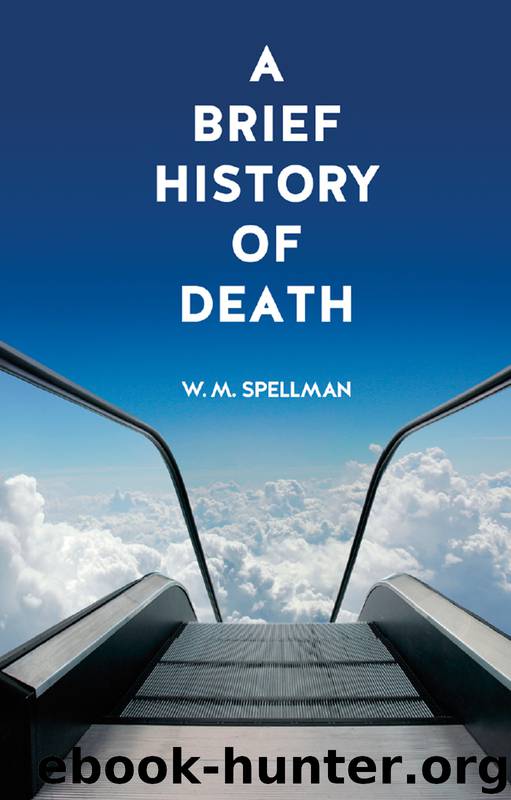A Brief History of Death by W. M. Spellman

Author:W. M. Spellman [Spellman, W. M.]
Language: eng
Format: mobi
Publisher: Reaktion Books
Published: 2014-08-19T04:00:00+00:00
Souls Asleep
Despite its harsh view of essential human nature, not all Protestant thought was fixated on the pains awaiting the unrepentant. Luther viewed death as release from sin and a bridge to a more intimate relation with God. He counselled that ‘all of us are not only not to fear death but even to wish for it, for death was to Abel, as it is to every righteous man, a door; it is passing over from humanity to divinity, from the world to the father, from misery to glory.’74 By the middle of the seventeenth century, the English clergyman William Drummond could refer to this passing as ‘but a short, nay, sweet sigh; and . . . not worth remembrance,’ while the noted liturgist Jeremy Taylor could dismiss the death experience as ‘so harmless a thing, that no good man was thought to be more miserable for dying, but much the happier’.75
But since it was difficult for Protestants to conceive of immediate elevation to Heaven for the Elect of God, some type of surrogate for the Catholic purgatory seemed unavoidable. During the course of the first century after the break from Rome, one of the more controversial explanations offered involved the rest or sleep of the immortal soul between the time of death and the general resurrection. Luther appears to have flirted with the soul-sleeping position in his early writings, quoting in his commentary on the Epistle to the Hebrews St John Crysostom’s (c. 344–407) words that death ‘is little more than a sleep’.76 William Tyndale (c. 1494–1536), the English scholar who first translated the Bible directly from Hebrew and Greek texts into English, agreed with the early Lutheran view. Edward VI’S Protestant Archbishop of Canterbury, Thomas Cranmer (1489–1556), felt concerned enough about the dissemination of the soul-sleeping thesis that the 1552 Articles of Religion, which subsequently formed the basis for the official Thirty-Nine Articles of the Church of England (1563), included an affirmation that the souls of the deceased neither die with the body nor sleep in idleness. John Calvin’s (1509–1564) firm opposition to soul-sleeping, set out most clearly in his first published work, the Psychopannychia (1534), ensured that later English Puritans would be hostile to the concept.77 By the middle of the seventeenth century, a Puritan-dominated Parliament called for the imprisonment of anyone who claimed that the soul sleeps or dies at the moment of bodily expiration.78
Calvin’s refusal to entertain such a radical alternative to purgatory as soul-sleeping left him with the unpleasant prospect of working with something akin to Catholic notions of the person after death. As he conceded in somewhat imprecise fashion, the recently departed souls of the Elect must enjoy ‘blessed rest, where they wait with joy and pleasure for the fruition of the promised glory’ while the damned are ‘confined and bound in chains’, each state ‘being but a foretaste of what will follow in the last day’.79 Perhaps recognizing the affinity of this position with the Catholic standard, he insisted that ‘over-curious inquiry respecting the intermediate state is neither lawful nor useful’.
Download
This site does not store any files on its server. We only index and link to content provided by other sites. Please contact the content providers to delete copyright contents if any and email us, we'll remove relevant links or contents immediately.
| Africa | Americas |
| Arctic & Antarctica | Asia |
| Australia & Oceania | Europe |
| Middle East | Russia |
| United States | World |
| Ancient Civilizations | Military |
| Historical Study & Educational Resources |
Cecilia; Or, Memoirs of an Heiress — Volume 1 by Fanny Burney(32544)
Cecilia; Or, Memoirs of an Heiress — Volume 2 by Fanny Burney(31942)
Cecilia; Or, Memoirs of an Heiress — Volume 3 by Fanny Burney(31929)
The Secret History by Donna Tartt(19048)
Sapiens: A Brief History of Humankind by Yuval Noah Harari(14366)
Leonardo da Vinci by Walter Isaacson(13315)
The Radium Girls by Kate Moore(12017)
Sapiens by Yuval Noah Harari(5365)
How Democracies Die by Steven Levitsky & Daniel Ziblatt(5213)
The Wind in My Hair by Masih Alinejad(5091)
Homo Deus: A Brief History of Tomorrow by Yuval Noah Harari(4906)
Endurance: Shackleton's Incredible Voyage by Alfred Lansing(4768)
Man's Search for Meaning by Viktor Frankl(4580)
The Silk Roads by Peter Frankopan(4525)
Millionaire: The Philanderer, Gambler, and Duelist Who Invented Modern Finance by Janet Gleeson(4465)
The Rape of Nanking by Iris Chang(4202)
Joan of Arc by Mary Gordon(4099)
The Motorcycle Diaries by Ernesto Che Guevara(4089)
Stalin by Stephen Kotkin(3956)
